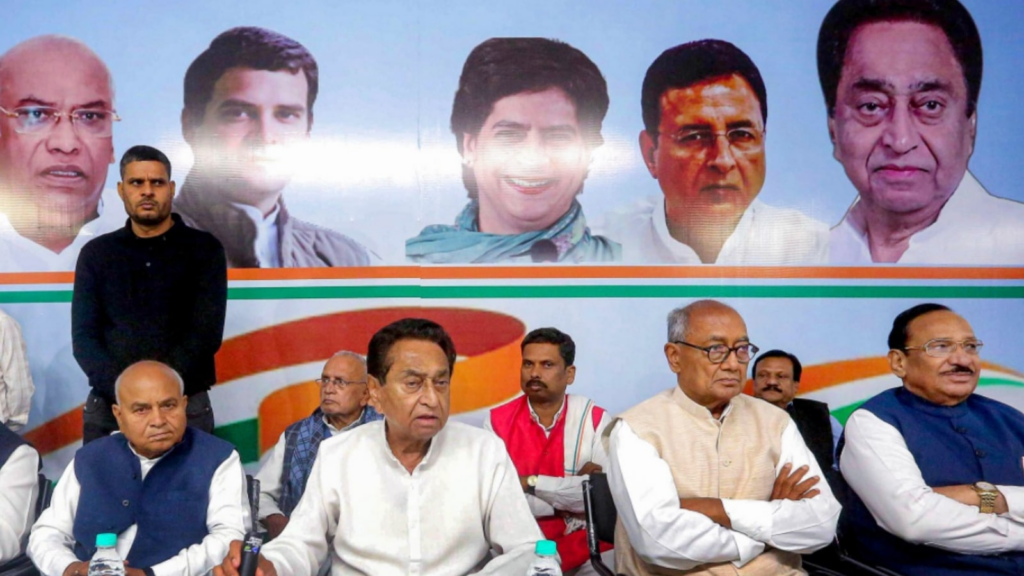Two months after Leader of Opposition Rahul Gandhi laid the groundwork for the Congress’s revival in Madhya Pradesh, the state unit has unveiled its strategy of strengthening its grassroots organisation by appointing former ministers, MLAs, and relatives of powerful leaders as district presidents. Of the 71 district president appointees, 21 are repeats, while 50 are new faces.
However, with many of the leaders appointed district chiefs harbouring high political ambitions, protests have broken out, yet again exposing deep factional rifts in the state Congress. Several public protests, social media tirades, and resignations have brought to the fore the extent of the party’s struggles.
“This is a high command initiative. Last month, when Rahul Gandhi came to Bhopal, he said the strongest leader should be the district president. We will all follow the party line,” Raghogarh MLA Jaivardhan Singh who has been appointed the party’s Guna district president told The Indian Express. Singh is the son of former Chief Minister Digvijaya Singh.
There were late-night protests on Saturday following the party’s move to overhaul its district organisation, with many leaders seeing their appointment as a demotion. “There are 15 people who never asked to be district president. Was feedback from the ground even taken? In places such as Satna, they’ve chosen people whose names local leaders are hearing for the first time,” said a senior Congress leader.
Apart from Satna, protests against the appointments were reported from places such as Bhopal, Indore, and Ujjain Rural. The party’s move sparked immediate resignations, with Hemant Patil in Burhanpur quitting all party posts and Gautam Bantu Gurjar quitting the party altogether after being passed over for the top post in Dewas Rural. In Satna, the Youth Congress chief mockingly asked for the new president’s contact details, while Dindori saw the strongest opposition, with Congress leader Ajay Sahu announcing effigy-burnings and calling the appointment of the new district chief the “worst formation”. Senior party leaders in Ujjain also expressed their displeasure with the leadership’s choices.
An analysis of the appointments reveals the delicate balancing act that the party attempted. Of the 71 district presidents, three are former ministers, six are sitting MLAs, and 11 are former MLAs. For the first time, four women received district chief positions, with 37 appointments in total going to reserved categories: 12 OBCs, 10 STs, 8 SCs, four women, and three from minority communities.
Former CM Kamal Nath, who had been sidelined since Jitu Patwari was made state party president, managed to secure 10 district president posts for his supporters, including Chhindwara, Jabalpur, and Rewa Rural; while Digvijaya Singh’s camp received five key posts, including Rajgarh where his nephew Priyavrat will take charge. Jitu Patwari’s allies maintained their hold in five urban centres, including Bhopal and Indore.
Asked about the appointments, state Congress vice-president Bhupendra Gupta said the party requires “leaders who can counter the BJP’s influence”.
“The BJP network has to be combated and we need such leaders who can counter this. There will be some tension always, but this is not unprecedented. Whether it is ticket distribution or organisation appointments, this does happen,” he said.
The criticism also extends to the appointment of numerous sitting MLAs as district presidents, a move veterans worry will compromise the legislators’ ability to effectively serve their constituencies. “If the MLAs are managing district party affairs, how will they attend to their legislative responsibilities?” asked a leader.
One of the Congress’s prominent tribal faces, Dindori MLA Omkar Singh Markam, is one such legislator who will now helm a district unit. Asked if he was happy at being appointed the Dindori district president, Markam, an old Digvijaya Singh confidant, told The Indian Express, “I will follow whatever directions the party has set out for me. Whatever the central leadership has decided, we will follow.”
Asked if his supporters had expressed dissatisfaction with the appointment, Markam said, “My supporters are independent and they are free to express their opinion. I will follow what senior leader Rahul Gandhi has asked us.”
What could be most damaging to party morale are allegations that some of the appointees maintain unofficial channels with the ruling BJP. “There are over a dozen such leaders who are in touch with the BJP,” claimed a senior Congress leader, contradicting the party’s stated objective of appointing as district presidents only those “not in touch with the BJP”.

